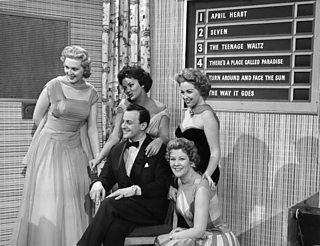
Broadcaster David Jacobs (centre), is pictured with singers from the first edition of the four-part series of 'Festival of British Popular Songs' host. The first UK Eurovision selection final held in 1957. The format would go through many title changes over the intervening years.
In this post, freelance journalist and Junior Eurovision commentator for the UK Ewan Spence looks back at some of his highlights from the UK's Eurovision 'national final' past.
From Studio 3 at Television Centre and Wembley Arena, to the National Lottery and the Royal Albert Hall: the 主播大秀 has used a variety of different venues (and different methods) to select the United Kingdom’s entry for the Eurovision Song Contest.
Friday, March 31st, 1978. Once more the 主播大秀 outside broadcast unit is at the Royal Albert Hall. Once more the dinner jackets are brought out to introduce the cream of British music. Once more the orchestra is ready to broadcast to the nation in the middle of the punk revolution.
Except this wasn’t the annual spectacular of The Proms: it was the 主播大秀’s selection show for the 1978 Eurovision Song Contest. A diverse range of performers took to the stage, including some blues funk from Labi Siffre, a pre-Bucks Fizz Cheryl Baker, and American singer-songwriter Bob James. The 主播大秀 even added a dash of punk rock in the Royal Albert Hall with the trailblazing 'Door In My Face' by .
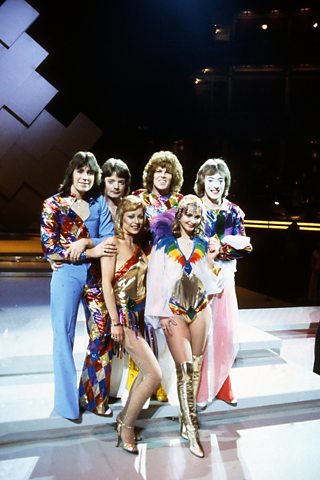
Coco, one of the groups who competed in the 1978 Song For Europe staged at the Royal Albert Hall. Pictured front right is Cheryl Baker, who would later form part of Bucks Fizz.
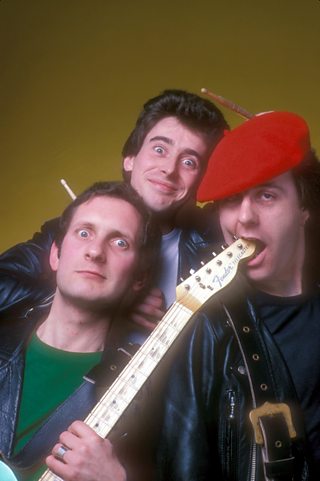
The Fruit Eating Bears also competed in the 1978 Song For Europe. Their performance did not involve one of them chewing on an electric guitar.
Punk rock would not be seen at Eurovision until 2015's Finnish entry from . Meanwhile, ’s place in Song Contest history is assured but we’re still waiting on .
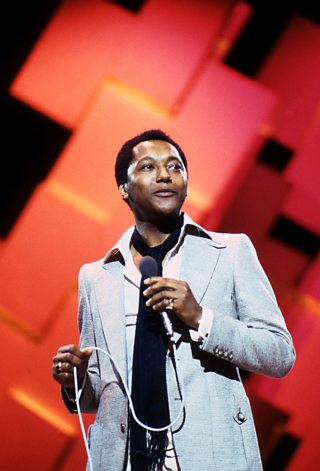
Labi Siffre also participated in the 1978 Song For Europe with the song Solid Love. He came fifth.
Selecting a song for Europe is a tricky business. Television producers across the continent, for the last sixty years, have tried to figure out the perfect way to pick an act for the Eurovision Song Contest, balancing the need to engage an television audience ahead of the main event with a desire to see the UK win the Contest.
And, for most Eurovision selection programmes - also known as the national final, these live competitive shows see the final decision is out of the hands of the producers. They can strive to get the best talent in the room, but it's up to the talent to shine on the night.
Eurovision fans love to bring up ABBA's victory in 1974 at every opportunity, but very few will rush to remind Swedish fans that one year before a group called Agnetha, Anni-Frid, Björn & Benny only finished third in Sweden's selection show Melodifestivalen. narrowly missing out on the Eurovision Song Contest that year.
But sometimes the public gets it right, and you don't need to be in a grand venue like the Royal Albert Hall. Ahead of the introduction of phone voting in the 1997 Eurovision Song Contest, the UK public was asked to make the decision on which song to send to Dublin through the .
Before Dale Winton released the balls, the stage was used to showcase the songs over a number of weeks, before a Sunday afternoon broadcast of the four songs accompanied the opening of the voting lines so the public could decide the winner.
Much as there is a corner of England that will always demand songs like '' should go to Eurovision, the public knew a real winner when it saw one. The ticket went to Katrina and the Waves and ‘’ ...although there was a six-day wait before the results were revealed live on the next National Lottery draw.
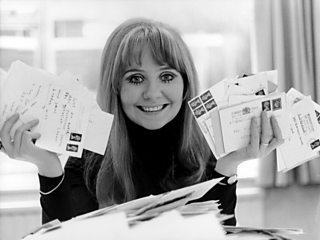
Lulu in a promotional shot holding postcard votes for the 1969 national selection programme for Eurovision. Lulu sang all of the songs in the selection programme. Boom Bang A Bang went on to represent the UK and won (along with a handful of other countries) the Eurovision final.
Television is an ever-changing medium, and programming styles constantly evolve. One of the key changes is speed - everything happens at a faster pace, there's far more moments in a show, and the public expect to be involved. In the early days that meant sending in a postcard to tell Lulu which of the five songs she had sung on the selection show was the most popular song, with the results announced a week later.
Today's broadcasts are a little bit faster, with phone calls and text messaging playing a key part in bringing the audience closer to the song and feeling part of the process. Hashtags may be the done thing to promote the discussion of a program online, but selecting a Eurovision act is one of the biggest interactive moments of the musical year.
National Finals have evolved - it's no longer enough to simply ask the audience what song they like. The 21st century selection shows, inspired by TV talent competitions, have brought about a new twist to the format: the panel.
Slowly replacing the classic regional juries of the 1980s that sought to mimick the finals of the Eurovision Song Contest, panels offered expert opinions from those who have experience at the Contest, who have relevant skills or background in dancing and choreography, or have experience that can help advise the public what might help score douze points.
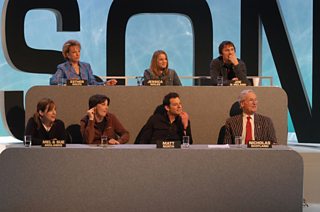
The panel for the 2003 Song For Europe national final. Jessica Garlick (top row, middle) had represented the UK in 2002 with her song Come Back, coming third in the final voting table. Mel Giedroyc and Sue Perkins (bottom left) make an appearance too. The song that won Song For Europe - Cry Baby - came last with 'nul points' at the 2003 Eurovision.
Sometimes the panel can have a huge impact on the show. In 2009 - in another series of Eurovision: Making Your Mind Up - the public selected the two least favourite acts each week over a number of heats with the panel getting a 'vote to save'. Other panels have no direct input on the result but some Eurovision fans have never forgiven John Barrowman when he loudly exclaimed, "That's so Eurovision!" unwittingly anointing Scooch's 'Flying The Flag' as viewing public preferred choice to represent the UK at the Contest that year.
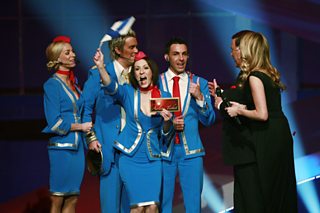
Scooch won the UK national final - Eurovision: Making Your Mind Up - in 2007. Scooch came second from last with their song 'Flying the Flag (For You)' in the Eurovision final.
How a song is selected has changed through the years. The 主播大秀 is not alone in using different formats: broadcasters across Europe use a range of different venues: arenas with capacities of 65,000; intimate studio settings with less than a hundred people standing at the side of the stage.
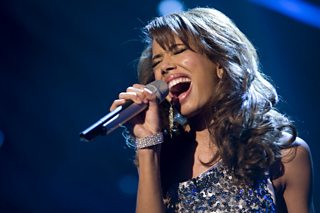
Jade Ewen sang won the 2009 selection programme 'Eurovision: Your Country Needs You' in which a variety of performers competed in a month-long elimination for a chance to sing Andrew Lloyd-Webber's song. Jade came fifth in the Eurovision, staged in Russia that year. Our best performance since Jessica Garlick in 2002.
The last few years have seen the 主播大秀 use an internal selection process, but in the current environment of interactivity and social media, it is right that the 主播大秀 uses the National Final to showcase the musical talent the UK has to offer. It's great that the music is presented in a suitable environment, and it is surely right that the public has the final say.
There's a reason it's called ""
Ewan Spence is a freelance journalist and editor of Eurovision website
- is live on 主播大秀 Four at 7.30pm tonight
- Test your knowledge of UK acts at Eurovision with 's special quiz
- Follow and for live updates throughout the evening
- The Eurovision Song Contest shows live from Stockholm will be on 10, 12 and 14 May
